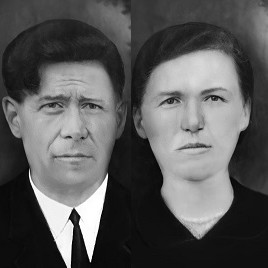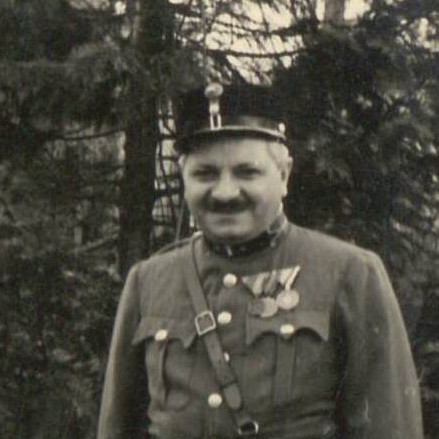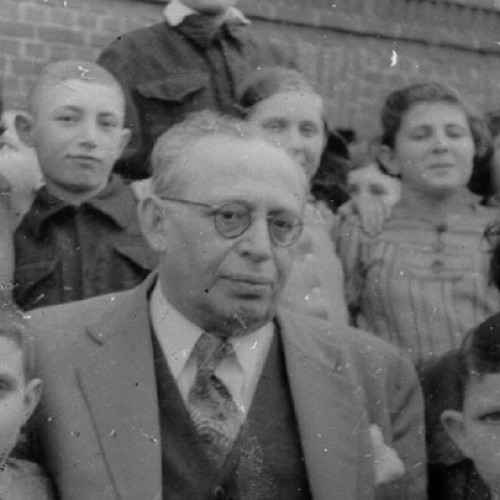Fedor Bojmistruk (1905-1978) Kateryna Bojmistruk (1909-2000) - Instytut Pileckiego
Fedor Bojmistruk (1905-1978) Kateryna Bojmistruk (1909-2000)
Awarded in 2022.

“I was crying in the barn, next to the corpses of two boys and an elderly man. I was holding a tiny piece of bread in one hand and a handkerchief with two letters in another. The letters were probably my initials.
What were they? I don’t know,” Hanna Muszyd, maiden name Boymistruk, said about the events from many years ago. She did not remember the Volhynia Massacre she had survived at the age of about two. All she knew was what her neighbors had told her.
Her family died on 30 August 1943, when the units of the Ukrainian Insurgent Army murdered some 600 people in the Polish village of Gaj. Two days later, they forced Ukrainian farmers from the nearby village of Kashivka to bury the corpses. In one of the barns, the Ukrainians found a little girl who was walking around the corpses and crying. They decided to take her, despite fearing that the Banderites could burn down and murder their village for rescuing a Polish child. Kateryna and Fedor Boymistruk gave the girl shelter, baptized her in the Orthodox Church and named her Hanna.
The Ukrainian Insurgent Army soon demanded the girl be handed over to them, but Fedor Boymistruk each time refused to give her up: “She is my daughter – you would have to shoot me first.” Following the advance of the front, Fedor was enlisted into the Red Army. Kateryna stayed home with Hanna and on many occasions was forced to hide from Ukrainian nationalists. After Fedor returned from the war, the Boymistruks gave Hanna a loving home and treated her like their own child. “Kids bullied me at school by saying, ‘you are not really your parents’ daughter. You are a Polish foundling.’ I would come home crying, and my mum would hug me and say, ‘do not listen to such nonsense. You are our child and that is all,’” Hanna recalled.
Fedor and Kateryna Boymistruk never told her she was a Polish girl found in the village of Gaj. Hanna learned the truth about her origins as an adult from her adoptive aunt.
Later on, Fedor and Kateryna Boymistruk took her in. There were many children in our household, while they had none of their own. They took her in and raised her like their own daughter. The truth is, they were risking their lives. We all were – if the Banderites found out, they could kill everyone.
See also
- Jenő Etter (1889–1973)

awarded
Jenő Etter (1889–1973)
The mayor of the Hungarian city of Esztergom received dozens of letters written in Polish. The greeting lines themselves showed the sympathy and gratefulness of the Polish refugees: “Dear Captain!”, “Dear Doctor!”. Jenő Etter understood them all.
- Herasym Łukiańczuk

awarded
Herasym Łukiańczuk
(1890–1953)“He walked slowly and told me discreetly: ‘Don’t go anywhere, maybe they won’t see you. I will come and get you in the evening. Your brother is already at my place,’” recalled Leokadia Skowrońska, who was saved by Herasym Lukianchuk.
- Abraham Silberschein (1881—1951)

awarded
Abraham Silberschein (1881—1951)
He was a member of the Ładoś Group, which issued illegal Latin American passports to European Jews. His role in the group was to provide lists and photographs of people who were to receive the passports.


